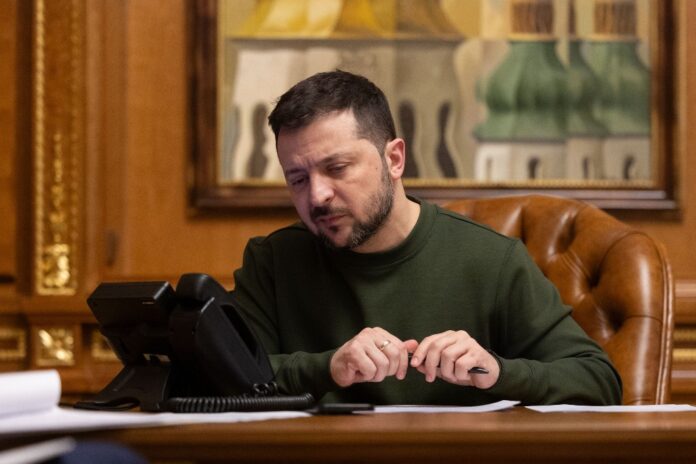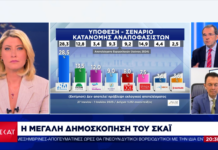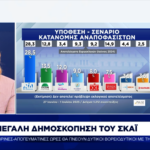BY ANATOL LIEVENFEBRUARY 24, 2024
Anatol Lieven directs the Eurasia Program at the Quincy Institute for Responsible Statecraft and is co-author of The Diplomatic Path to a Secure Ukraine, to be published in late February 2024.
The long-awaited counteroffensive last year failed. Russia has recaptured Avdiivka, its biggest war gain in nine months. President Volodymyr Zelensky has been forced to quietly acknowledge the new military reality. The Biden Administration’s strategy is now to sustain Ukrainian defense until after the U.S. presidential elections, in the hope of wearing down Russian forces in a long war of attrition.
This strategy seems sensible enough, but contains one crucially important implication and one potentially disastrous flaw, which are not yet being seriously addressed in public debates in the West or Ukraine. The implication of Ukraine standing indefinitely on the defensive—even if it does so successfully—is that the territories currently occupied by Russia are lost. Russia will never agree at the negotiating table to surrender land that it has managed to hold on the battlefield.
This does not mean that Ukraine should be asked to formally surrender these lands, for that would be impossible for any Ukrainian government. But it does mean that—as Zelensky proposed early in the war with regard to Crimea and the eastern Donbas—the territorial issue will have to be shelved for future talks.
As we know from Cyprus, which has been divided between the internationally recognized Greek Republic of Cyprus and the Turkish Republic of Northern Cyprus since 1974, such negotiations can continue for decades without a solution or renewed conflict. A situation in which Ukraine retains its independence, its freedom to develop as a Western democracy, and 82% of its legal territory (including all its core historic lands) would have been regarded by previous generations of Ukrainians as a real victory, though not a complete one.
As I found in Ukraine last year, many Ukrainians in private were prepared to accept the loss of some territories as the price of peace if Ukraine failed to win them back on the battlefield and if the alternative was years of bloody war with little prospect of success. The Biden Administration needs to get America on board too.
Yet supporters of complete Ukrainian victory have engaged in hopes that range from the overly optimistic to the magical. At the magical end of the spectrum is the notion, set out by retired U.S. Army General Ben Hodges among others, that Russia can be defeated, and even driven from Crimea, by long-range missile bombardment.
This is folly. Ukrainians have scored some notable successes against the Russian Black Sea Fleet, but to take back Crimea they would need to be able to launch a massive amphibious landing, an exceptionally difficult operation far beyond their capabilities in terms of ships and men. Attacks on Russian infrastructure are pinpricks given Russia’s size and resources.
More realistic is the suggestion that by standing on the defensive this year, Ukrainians can inflict such losses on the Russians that—if supplied with more Western weaponry—they can counterattack successfully in 2025. However, this depends on the Russians playing the game the way Kyiv and Washington want to play it.
The Russian strategy at present appears to be different. They have drawn Ukrainians into prolonged battles for small amounts of territory like Avdiivka, where they have relied on Russian superiority in artillery and munitions to wear them down through constant bombardment. They are firing three shells to every one Ukrainian; and thanks in part to help from Iran, Russia has now been able to deploy very large numbers of drones.
For Ukrainians to stand a chance, military history suggests that they would need a 3-to-2 advantage in manpower and considerably more firepower. Ukraine enjoyed these advantages in the first year of the war, but they now lie with Russia, and it is very difficult to see how Ukraine can recover them.
The Biden Administration is entirely correct to warn that without further massive U.S. military aid, Ukrainian resistance is likely to collapse this year. But U.S. officials also need to recognize that even if this aid continues, there is no realistic chance of total Ukrainian victory next year, or the year after that. Even if the Ukrainians can build up their forces, Russia can deepen its defenses even more.
The Biden Administration has a strong incentive to test President Vladimir Putin on the sincerity or insincerity of his statements that Russia is ready for peace talks. A successful peace process would undoubtedly involve some painful concessions by Ukraine and the West. Yet the pain would be more emotional than practical, and a peace settlement would have to involve Putin giving up the plan with which he began the war, to turn the whole of Ukraine into a Russian vassal state, and recognizing the territorial integrity of Ukraine within its de facto present borders.
For the lost Ukrainian territories are lost, and NATO membership is pointless if the alliance is not prepared to send its own troops to fight for Ukraine against Russia. Above all, however painful a peace agreement would be today, it will be infinitely more so if the war continues and Ukraine is defeated. (ΤΙΜΕ)

TIME: Η Ουκρανία δεν μπορεί να κερδίσει τον πόλεμο (με την Ρωσία)
Με τον πλέον επίσημο τρόπο η ναυαρχίδα του Δυτικού Τύπου το περιοδικό Time παραδέχεται ότι έκανε ένα πολύ μεγάλο λάθος στην αρχική του πρόβλεψη ότι είναι δυνατή μία ουκρανική νίκη επί της Ρωσίας.
Αναγνωρίζει την πραγματικότητα, που έχει διαμορφωθεί στο πεδίο της μάχης, αναιρώντας όλα όσα έγραφε τον Αύγουστο 2023 όταν και ισχυριζόταν πως η Ουκρανία έχει αρκετές πιθανότητες να επικρατήσει και να ανακαταλάβει τα εδάφη που έχασε. Πριν από οκτώ μήνες το Time έγραφε: «Η κατάσταση στην Ουκρανία εξακολουθεί να ευνοεί το Κίεβο.
Η πρόοδος της Ουκρανίας πιθανότατα θα εναλλάσσεται με περιόδους αξιοσημείωτων τακτικών επιτυχιών αλλά καi χρονικά σημεία στασιμότητας και κάποιες υποχωρήσεις. Όμως η ουκρανική αντεπίθεση μπορεί να πετύχει με διάφορους τρόπους. Η Ουκρανία είναι για τα καλά στο παιχνίδι… αρκεί η Δύση να παραμείνει σταθερή στην υποστήριξή της».
Time: Η Ουκρανία δεν μπορεί να κερδίσει τον πόλεμο
Έχουν περάσει οκτώ μήνες από τότε και δαπανήθηκαν πολλά δισεκατομμύρια δολάρια σε αμερικανική βοήθεια για να έλθει το περιοδικό και να παραδεχθεί ότι έκανε λάθος, το οποίο επισημοποιεί στο καινούργιο του τεύχος σε άρθρο του Anatol Lieven του Ινστιτούτου Quincy.
«Η πολυαναμενόμενη αντεπίθεση των Ουκρανών πέρυσι απέτυχε», παραδέχθηκε ωμά ο Liven. «Η Ρωσία ανακατέλαβε την Avdiivka, το μεγαλύτερο πολεμικό της κέρδος εδώ και εννέα μήνες. Ο πρόεδρος Volodymyr Zelensky αναγκάστηκε να αναγνωρίσει αθόρυβα τη νέα στρατιωτική πραγματικότητα», σημειώνει.
Ο Lieven παρατηρεί ότι η ρητορική της Ουάσιγκτον έχει αλλάξει. «Η στρατηγική της κυβέρνησης Biden προσανατολίζεται τώρα στη διατήρηση της ουκρανικής άμυνας μέχρι τις προεδρικές εκλογές των ΗΠΑ (Νοέμβριος 2024), με την ελπίδα να εξαντληθούν οι ρωσικές δυνάμεις σε έναν μακρύ πόλεμο φθοράς», επισημαίνει χαρακτηριστικά.
«Η Ρωσία δεν θα συμφωνήσει ποτέ να παραδώσει εδάφη που κέρδισε στη μάχη»
Το περιοδικό μεταφέρει μία νέα στρατηγική στην οποία θα προσπαθήσει να εστιάσει η αμερικανική ηγεσία, η οποία δεν είναι άλλη από τη διατήρηση των αμυντικών θέσεων της Ουκρανίας και τη μη κατάληψη άλλων εδαφών από τους Ρώσους…προσμένοντας σε ένα θαύμα μέχρι το 2025. «Η Ρωσία δεν θα συμφωνήσει ποτέ στο τραπέζι των διαπραγματεύσεων να παραδώσει γη που κατάφερε να κρατήσει στο πεδίο της μάχης», υποστηρίζει και πολύ σωστά ο Lieven.
Η ρωσική ηγεσία έχει αποφασίσει να ολοκληρώσει την ειδική στρατιωτική επιχείρηση επιτυγχάνοντας όλους τους στόχους που έχει θέσει, με κυρίαρχο εκείνον των απαραίτητων εγγυήσεων ασφαλείας που επιτάσσει τη δημιουργία μίας ευρείας αποστρατιωτικοποιημένης ζώνης στην Ουκρανία, πέραν των εδαφών που ήδη έχουν καταληφθεί.
Οδυνηρές παραχωρήσεις
«Μια επιτυχημένη ειρηνευτική διαδικασία θα συνεπαγόταν αναμφίβολα ορισμένες οδυνηρές παραχωρήσεις από την Ουκρανία και τη Δύση» επισημαίνει το Time που θεωρεί ιδανικό ένα σενάριο διαπραγμάτευσης η Ρωσία να συμφωνήσει να «μη μετατρέψει την Ουκρανία σε ένα υποτελές κράτος» και να μείνει στα εδάφη που έχει κερδίσει μέχρι σήμερα.
«Διότι τα χαμένα ουκρανικά εδάφη είναι χαμένα και η ένταξη στο ΝΑΤΟ είναι άσκοπη εάν η Συμμαχία δεν είναι διατεθειμένη να στείλει τα δικά της στρατεύματα για να πολεμήσουν για την Ουκρανία εναντίον της Ρωσίας. Πάνω από όλα, όσο επώδυνη θα ήταν σήμερα μια ειρηνευτική συμφωνία, θα είναι απείρως περισσότερο αν ο πόλεμος συνεχιστεί και η Ουκρανία ηττηθεί», σημειώνει ο Lieven. bankingnews














